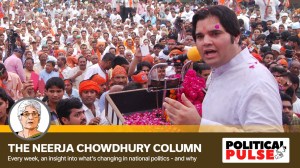- India
- International
Why India needs to stop participating in Commonwealth Games
Menaka Guruswamy writes: What all 72 countries participating in the Games have in common is that Britain took our wealth. Hence our “commonwealth” is now British wealth
 India's Tulika Maan after her win against Sydnee Andrews of New Zealand in the Women's +78Kg semifinals. (Photo: Doordarshan Sports/Twitter)
India's Tulika Maan after her win against Sydnee Andrews of New Zealand in the Women's +78Kg semifinals. (Photo: Doordarshan Sports/Twitter)On August 4, at 3:30 am, police constable Amrita’s phone rang. It was her daughter Tulika Maan, calling to tell her sole parent that she had won a silver medal in the 78 kg category in judo in the ongoing Commonwealth Games. There are few things more inspiring than watching our athletes like Tulika shine against all odds. Sporting excellence is a realm where human beings marry skill, perseverance, and sacrifice — all the highest qualities possible in our species — while bringing joy to us viewers.
Meanwhile, as Tulika basks in her well-earned glory, PV Sindhu is hungry for a singles gold medal in badminton and is winning her matches with ease. Our male boxers are proceeding to the semi-finals, as has the men’s hockey team. On the face of it, there doesn’t seem to be much wrong with these Commonwealth Games that give our sportspersons a chance to demonstrate their skills. But there is something wrong with the very idea of these games.
The 2022 edition of the Commonwealth Games that are being held in Birmingham, UK, includes athletes from 72 nations and territories that had once been colonised by the British. Colonialism, which saw the impoverishment of colonies like India, has its underpinnings in racism and greed. What all 72 countries participating in the Games have in common is that Britain took our wealth. Hence our “commonwealth” is now British wealth.
The natives of the colonies were subjugated, civilised and then disciplined with devices like the Indian Penal Code, 1860. That Britain has a terrible immigration policy at present as well, which intertwines with its colonial past, was a point well made by the comedian Joe Lycett at the opening ceremony of the 2022 games — “I am going to do something now that the British government doesn’t always do, and welcome some foreigners.”
As The Guardian’s Tumaini Carayol reminds us, the games were once known as the British Empire Games (BEG), then the British Empire and Commonwealth Games, and then the British Commonwealth Games. Queen Elizabeth is the head of the Commonwealth. The closest relationships are still enjoyed by the settler countries – Australia, Canada and New Zealand. British citizens went to settle in these lands and while doing so virtually wiped out or rendered destitute the indigenous populations.

From India’s perspective the taint of the Commonwealth Games is more than just symbolic. The economist Utsa Patnaik speaking to the media in November 2018, explains that over roughly 200 years (1765 to 1938), the East India Company and the British Raj siphoned out nearly $44.6 trillion from India. She calculated this by taking India’s export surplus earnings as the measure and compounding it at a 5 per cent interest rate. Patnaik argues, “Indians were never credited with their own gold and forex earnings. Instead, the local producers were ‘paid’ the rupee equivalent out of the budget.” She adds that there was “virtually no increase in per capita income between 1900 and 1946, even though India registered the second largest export surplus earnings in the world for three decades before 1929.”
Patnaik is the author of many scholarly works like A Theory of Imperialism (co-authored with Prabhat Patnaik) and The Republic of Hunger. She illustrates what British colonialism meant for India through statistics on life expectancy and food consumption. Patnaik notes that India’s life expectancy in 1911 was 22 years. India’s per capita consumption of food grains went down from 200 kg in 1900 to 157 kg on the eve of the Second World War. By 1946, it fell further to an abysmally low 137 kg. This consistent starvation and impoverishment of India started with early British practices of greedy taxation. The British East India Company first got revenue collecting rights in Bengal in 1765 and it promptly tripled the tax revenue from Bengal. People were forced into starvation, and a massive famine in 1770 saw the death of roughly 10 million people, out of a total population of 30 million.
But such policies were not just implemented in the 1700s. Winston Churchill’s wartime colonial policies resulted in the death by starvation of approximately four million Indians in the Bengal famine of 1943. Britain’s wartime escalation was paid for by appropriating the land (for camps and airstrips, amongst other reasons) of Bengal’s poor. India was also forced to pay for British defence expenditure, above what was already paid in peacetime. The British kept presses in India working overtime to print Indian rupees during this time, pushing up inflation and making food more expensive.
The lack of a memory culture in India about what was done to us under the British Raj is a profound and persistent mistake. We have neither a government-established museum to memorialise the grief and loss of Partition, nor a good economics textbook to teach our young about the colonial-era impoverishment of India. There is a private museum to Partition in Amritsar, which I highly recommend. Nearby is also a memorial to the Jallianwala Bagh massacre where on April 13, 1919, General Dyer ordered his troops to fire 1,650 rounds into a large crowd of unarmed Indians resulting in hundreds of deaths. A hundred years later, in 2019, the then British Prime Minister Theresa May, when pressed in parliament by her colleague Bob Blackman to apologise on the country’s behalf, expressed her “regrets” but refused to apologise.
Our athletes need international competitions to participate in. Perhaps the government and sports ministry can support participation in other games and contests. Alternatives must be considered. In this era of fierce, chest-thumping nationalism, we need some quiet dignity as well. A dignity that would not countenance being part of a Commonwealth Games that celebrates our former enslavement. We should have asked for reparations for what was stolen from us. Unfortunately, nations don’t return stolen wealth. At least let us keep our dignity.
The writer is a Senior Advocate at the Supreme Court of India
EXPRESS OPINION
Apr 24: Latest News
- 01
- 02
- 03
- 04
- 05










































